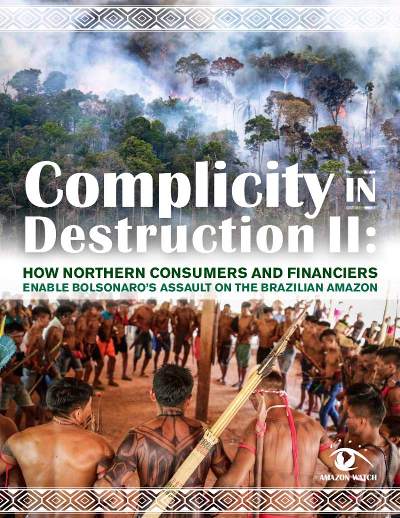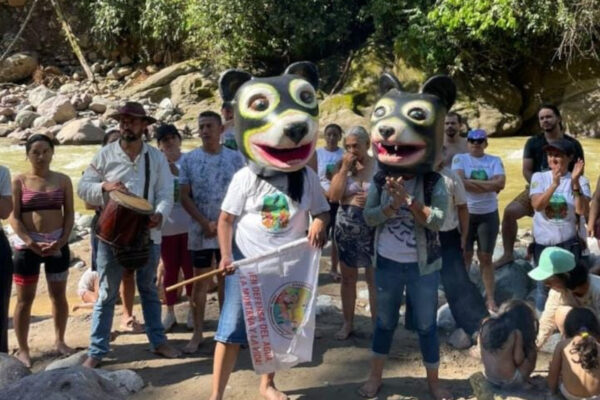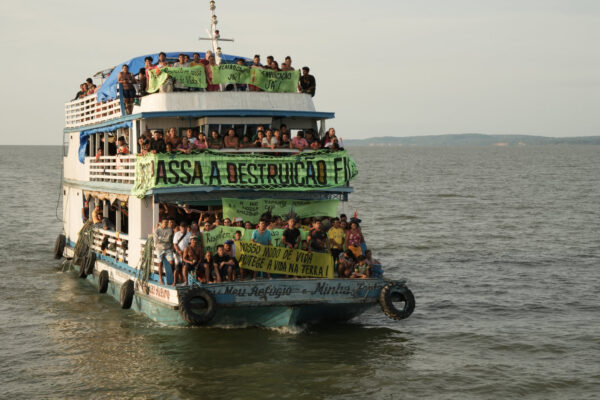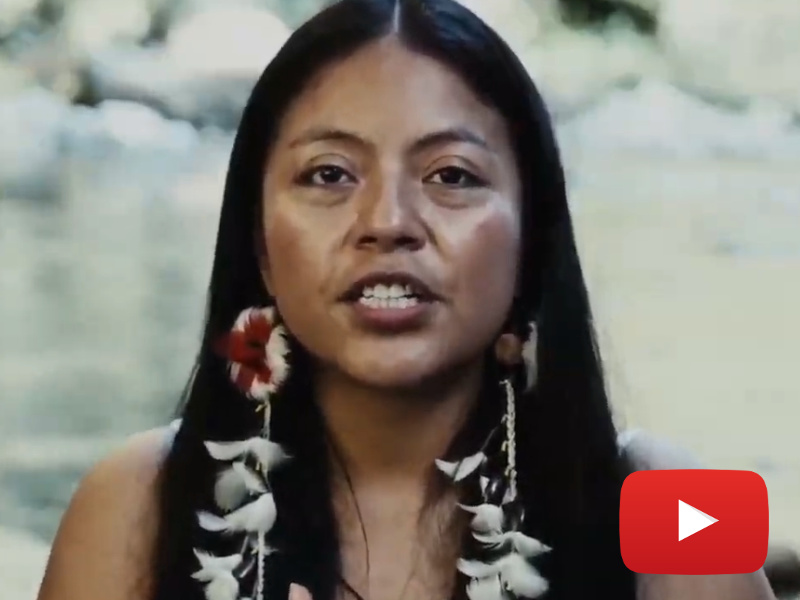As the sun rose on Brasília’s “Esplanade of Ministries” on April 24th, thousands of representatives of Brazil’s indigenous communities descended on the country’s political epicenter. As tents were raised to form an encampment, songs and traditional dances broke out among the participants, who had traveled from far and wide to make their voices heard before a government determined to strip their rights and decimate their territories.
The 2019 Acampamento Terra Livre (“Free Land Encampment”) commenced in a climate of repression, as Brazil’s extreme right-wing president Bolsonaro ordered his Justice Minister to call in the National Guard to police the peaceful mobilization. The presence of military in the nation’s capital loomed large over the assembly, which Bolsonaro deceptively claimed to have been backed by taxpayer money, in a move seen as an incitation of violence. From Brasília, Amazon Watch accompanied Terra Livre‘s organizers through its preparation of this critical event, helping the organization to establish the camp under tense and menacing circumstances.
In its 15th year, Terra Livre serves as the largest annual gathering of Brazil’s National Indigenous Movement (MNI), organized by the country’s principal indigenous organization APIB. The mobilization provides native peoples with an important platform to protest legislative and judicial attacks on their hard-fought rights, while denouncing increasing violence against their communities and invasions and destruction of their ancestral lands. The mobilization also allows Brazil’s indigenous leadership to engage in dialogue with political representatives and forge other alliances, including with international civil society.
This year’s gathering was arguably the most important of its kind, as the MNI confronts the most serious assault on indigenous rights and environmental protections since the fall of Brazil’s brutal military dictatorship in 1985. “We are witnessing a legislative genocide,” warned Sônia Guajajara, Executive Coordinator of APIB.
As the Brazilian government’s ruthless, coordinated attack on human rights and environmental safeguards advances, the MNI is mounting determined and inspiring opposition. “For 518 years we have waged resistance to guarantee our existence,” said Sônia. “We are only still here because we resisted and we will continue fighting. We will not give up our rights, we will not give up our lives, we will not retreat.”
And as the movement weathers declining political and institutional support in Brazil, APIB is ramping up an international campaign to leverage business and political links to Brazil’s powerful agribusiness sector, calling for a global boycott of agricultural commodities linked to socio-environmental conflict. It was in this spirit that Amazon Watch forged a fruitful partnership with APIB, answering their call to expose corporate ties between the worst actors in Brazilian agribusiness and global importing companies, commodity traders, and financial institutions that enable their destructive behavior.
 In Terra Livre‘s plenary session on April 25th, APIB launched a new report that significantly advances their international campaign. Published simultaneously with Amazon Watch, Complicity in Destruction II: How Northern Consumers and Financiers Enable Bolsonaro’s Assault on the Brazilian Amazon shows for the first time how firms that fuel the destruction of the Brazilian Amazon under Bolsonaro openly trade with and receive financing from a range of companies and major investors in Europe and North America.
In Terra Livre‘s plenary session on April 25th, APIB launched a new report that significantly advances their international campaign. Published simultaneously with Amazon Watch, Complicity in Destruction II: How Northern Consumers and Financiers Enable Bolsonaro’s Assault on the Brazilian Amazon shows for the first time how firms that fuel the destruction of the Brazilian Amazon under Bolsonaro openly trade with and receive financing from a range of companies and major investors in Europe and North America.
Although these producers of soy, cattle, and timber for export have documented links to illegal deforestation, corruption, slave labor, and other crimes, they nonetheless do business with investors and companies based in countries that are Brazil’s three largest trading partners: China, the European Union and the United States. Our findings provide empirical data identifying strategic leverage points that can influence the worst behavior of Bolsonaro’s regime.
“This is the weapon of the future,” said Luiz Eloy Terena, a key leader of the MNI and legal council for APIB. Holding the report over his head, he continued: “In the past, when we brought our demands for a boycott of Brazilian conflict commodities to concerned European policymakers, they would ask us, ‘Which are the responsible companies?’ We couldn’t tell them then, but we can now.”
Terra Livre‘s final document emphasizes the importance of strategic Brazilian industries – and their international counterparts – to both establishing and enabling Bolsonaro’s regressive agenda, stating:
The economic project of the Bolsonaro government answers to powerful financial interests, to private corporations, many of them international, including agribusiness and mining interests, among others. Therefore, it is a highly beholden government that is anti-national, predatory, ethnocidal, genocidal and ecocidal.
The document also lists a series of the MNI’s key demands, including the right to land as enshrined by the Constitution, adequate healthcare and education, freedom from mounting violence and land invasions on indigenous territories, the archiving of all anti-indigenous legislative initiatives, and Brazil’s adherence to international treaties and human rights mechanisms.
In the dire context of Bolsonaro’s assault on human rights, environmental stability, and democratic norms, the struggle of Brazil’s indigenous peoples not only provides vital inspiration among the country’s social movements, but also an urgent counterweight to rising fascism. As such, the MNI has positioned itself at the forefront of Brazil’s opposition movement, and it should serve as an inspiration to us all. “Our struggle is not only to defend the original peoples of the country, but also to advance a just, pluricultural, multiethnic, solidarity-based society,” said Sônia Guajajara.
Following Terra Livre, there has been a series of sister events staged across Brazil, from regional encampments in Roraima and Bahia states to major assemblies in indigenous territories. The impressive momentum of Brazil’s indigenous movement scored a critical victory today, as Bolsonaro’s polemic executive order stripping the mandate of indigenous agency FUNAI to title native territories was struck down by a congressional committee, restoring the institution’s mandate.
Last month’s Terra Livre mobilization was a shining example that determined resistance is alive and well in Brazil, particularly in the dark days of the Bolsonaro presidency. This resistance deserves widespread support, from local to global levels. Indeed, as our recent report indicates, the global public can play an important role in pushing back by sending a firm message to the Brazilian government: attacks on indigenous rights will not be tolerated.












